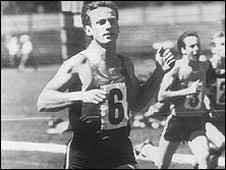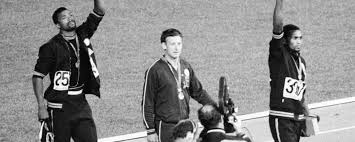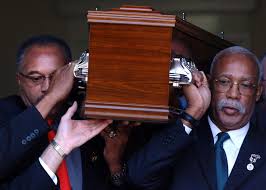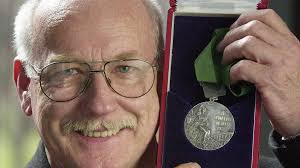1968 olympics

John Carlos and Tommy Smith were two African American sprinters from the United States. Carlos and Smith were both extraordinarily fast in the 200 meter dash. Carlos and Smith were projected to get first and second in the 1968 Olympics in Mexico. unheard of to anyone in the United States, Peter Norman, an Australian sprinter arrived in Mexico and ran on an official track for the first time in his career. Peter abruptly turned heads when he began set Australian records in his warm up heats. all of a sudden Carlos and Smith were going to have to work for their first and second place sweep, there was new competition. As the race began smith and Carlos were off to a great start but in the last 50 meters Peter Norman swept in and stole second place. Australia was ecstatic, Peter Norman, a no name, all of a sudden had stolen second place from one of the fastest people in the world. Peter was young also, this was his first time running on a real track, his first time being noticed on a international stage. Peter had his hole career in front of him
The salute

Most people knew Carlos and Smith were going to make some kind of gesture, but no one knew how drastic. Carlos and Smith were planning on raising their fist in the air with the black glove on it, and looking down, after the race the two went back to the locker room and realized that Carlos left his gloves back at the Olympic village. To only have one African American do the black power salute would have sent mixed messages, because of this neither Carlos nor Smith were going to do the salute. It was Peter Norman that suggested that they both use one glove. At this time in Australia there was civil unrest of its own. Aboriginal people were being prosecuted and not treated the same as everyone else. There was currently an organization called Olympic Project for Human Rights, Peter asked one of the US crew team members if he could borrow their badge. The badge read "Olympic Project for Human Rights". Knowing what was about to happen Carlos and Smith asked Peter if he wanted to go up on the stand with them, they didn't know what was going to happen, but they knew the reaction couldn't be good. Peter said he wanted to go up and stand with them. As the Star Spangled Banner began to play and Carlos and Smith raised their arms. Peter says he didn't know what was happening but he realized that they had gone through with their plan when the woman singing the national anthem stopped singing.
aftermath

The real tragedy comes after the solute. when the athletes came off the podium they were immediately scrutinized. Carlos and Smith were sent back to US immediately. Peter was not sent home until later in the games. Upon Peters arrival to Australia he was rejected from everyone he knew. his hometown did not want him, no one did. He was stripped of his silver medal and told he was not allowed to run in the next games. Peter was unable to get a job anywhere in Australia, he had to settle making minimum wage as a gym teacher, he was fired from that job because parents didn't want their kids around him, he had to settle as a butcher. Peter was then Invited by the Australian Olympic Committee to condemn Carlos and Smith. Had he done this he would have been invited to be on the Olympic Committee and helped coordinate the 2000 Olympic games in Australia. Peter stood his ground and would not chastise Carlos and Smith. Carlos and Smith said "If we were getting beat up the Peter was facing his entire country alone". This was true, Almost everyone in Peters hometown disgraced him. Peter was forced to live this way for almost the rest of his life, he was never admitted back to the olympics even though his times would have won him gold in the 1972 olympics, and he was never truly respected as an athlete. In 2000 the United States heard that Peter was not being let into the Sydney Olympic games, and he was invited to be the guest of honor in the United States Olympic Committee. Shortly after Peter died on October 9 2006. Carlos and smith carried his casket to his grave on the day of his funeral. Although Peter spent most of his life disgraced by his own people, perhaps the worst part of this event was that Peters run was overshadowed by greater political circumstances. Peters time was Incredible and had he not been involved in this event he could have gone one to be one of the greatest 200 runners in history.
Works Cited
Bell, Danna. "Memories of an Olympic Protest: John Carlos, Oral History, and the 1968 Mexico City Games." Library of Congress, blogs.loc.gov/teachers/2018/02/memories-of-an-olympic-protest-john-carlos-oral-history-and-the-1968-mexico-city-games/. Accessed 21 Oct. 2019.
---. "Memories of an Olympic Protest: John Carlos, Oral History, and the 1968 Mexico City Games." Library of Congress, blogs.loc.gov/teachers/2018/02/memories-of-an-olympic-protest-john-carlos-oral-history-and-the-1968-mexico-city-games/. Accessed 21 Oct. 2019.
CNN. 28 Apr. 2018, www.cnn.com/2018/04/28/asia/peter-norman-australia-honor-intl/index.html. Accessed 21 Oct. 2019.
Sydney Morning Harrold, Andrew Webster. "The real story about peter norman." Sydney Morning Harrold, 20 Oct. 2018, www.smh.com.au/sport/finally-the-real-story-about-peter-norman-and-the-black-power-salute-20181018-p50abm.html. Accessed 21 october 2019.
---. "The real story about peter norman." Sydney Morning Harrold, 20 Oct. 2018, www.smh.com.au/sport/finally-the-real-story-about-peter-norman-and-the-black-power-salute-20181018-p50abm.html. Accessed 21 october 2019.
"The Third Man." ESPN, 2019, www.espn.com/video/clip?id=17563687. Accessed 21 october 2019.
Wenban, David. "Negro Protest at the Olympics." Sydney Tribune [Sydney], 30 Oct. 1968, p. 11. National Library of Australia, trove.nla.gov.au/newspaper/article/237362207? Accessed 21 Oct. 2019.
---. "Negro Protest at the Olympics." Sydney Tribune [Sydney], 30 Oct. 1968, p. 11. National Library of Australia, trove.nla.gov.au/newspaper/article/237362207? Accessed 21 Oct. 2019.
Bell, Danna. "Memories of an Olympic Protest: John Carlos, Oral History, and the 1968 Mexico City Games." Library of Congress, blogs.loc.gov/teachers/2018/02/memories-of-an-olympic-protest-john-carlos-oral-history-and-the-1968-mexico-city-games/. Accessed 21 Oct. 2019.
---. "Memories of an Olympic Protest: John Carlos, Oral History, and the 1968 Mexico City Games." Library of Congress, blogs.loc.gov/teachers/2018/02/memories-of-an-olympic-protest-john-carlos-oral-history-and-the-1968-mexico-city-games/. Accessed 21 Oct. 2019.
CNN. 28 Apr. 2018, www.cnn.com/2018/04/28/asia/peter-norman-australia-honor-intl/index.html. Accessed 21 Oct. 2019.
Sydney Morning Harrold, Andrew Webster. "The real story about peter norman." Sydney Morning Harrold, 20 Oct. 2018, www.smh.com.au/sport/finally-the-real-story-about-peter-norman-and-the-black-power-salute-20181018-p50abm.html. Accessed 21 october 2019.
---. "The real story about peter norman." Sydney Morning Harrold, 20 Oct. 2018, www.smh.com.au/sport/finally-the-real-story-about-peter-norman-and-the-black-power-salute-20181018-p50abm.html. Accessed 21 october 2019.
"The Third Man." ESPN, 2019, www.espn.com/video/clip?id=17563687. Accessed 21 october 2019.
Wenban, David. "Negro Protest at the Olympics." Sydney Tribune [Sydney], 30 Oct. 1968, p. 11. National Library of Australia, trove.nla.gov.au/newspaper/article/237362207? Accessed 21 Oct. 2019.
---. "Negro Protest at the Olympics." Sydney Tribune [Sydney], 30 Oct. 1968, p. 11. National Library of Australia, trove.nla.gov.au/newspaper/article/237362207? Accessed 21 Oct. 2019.

